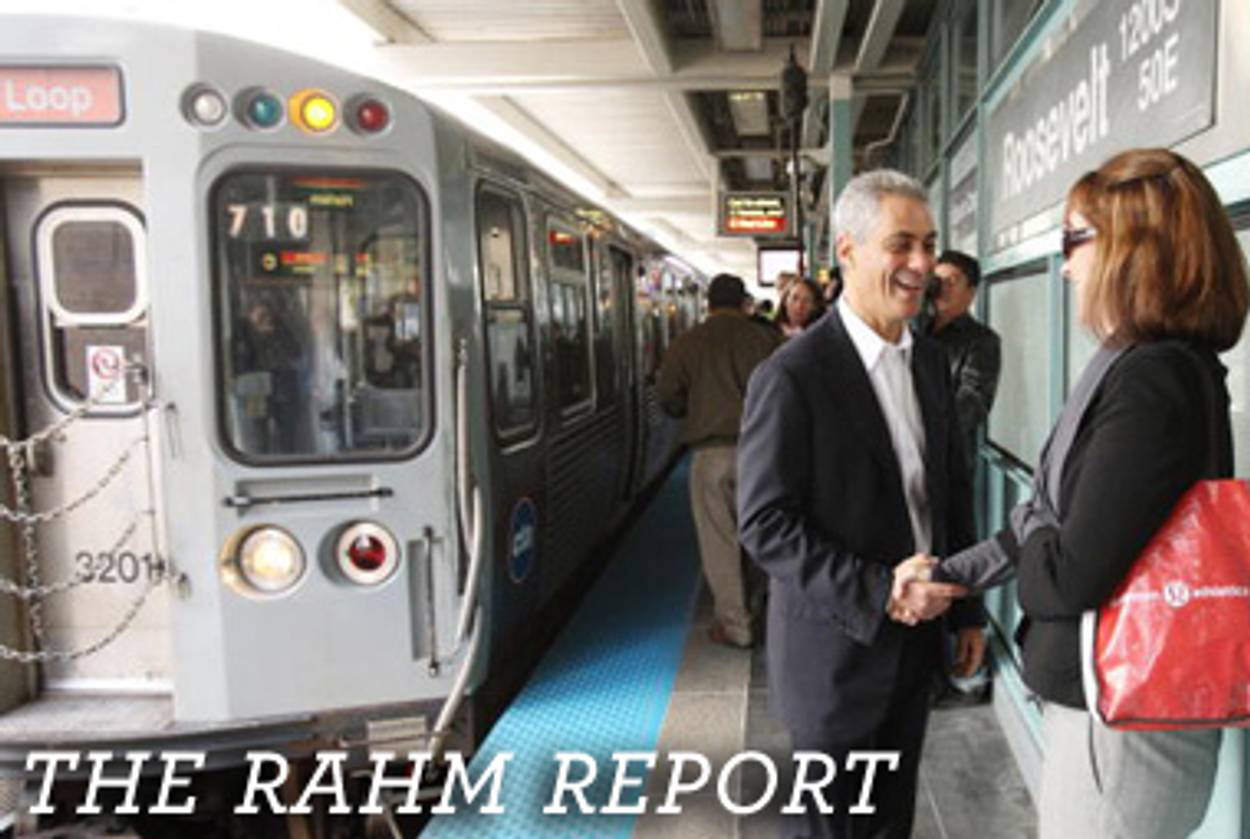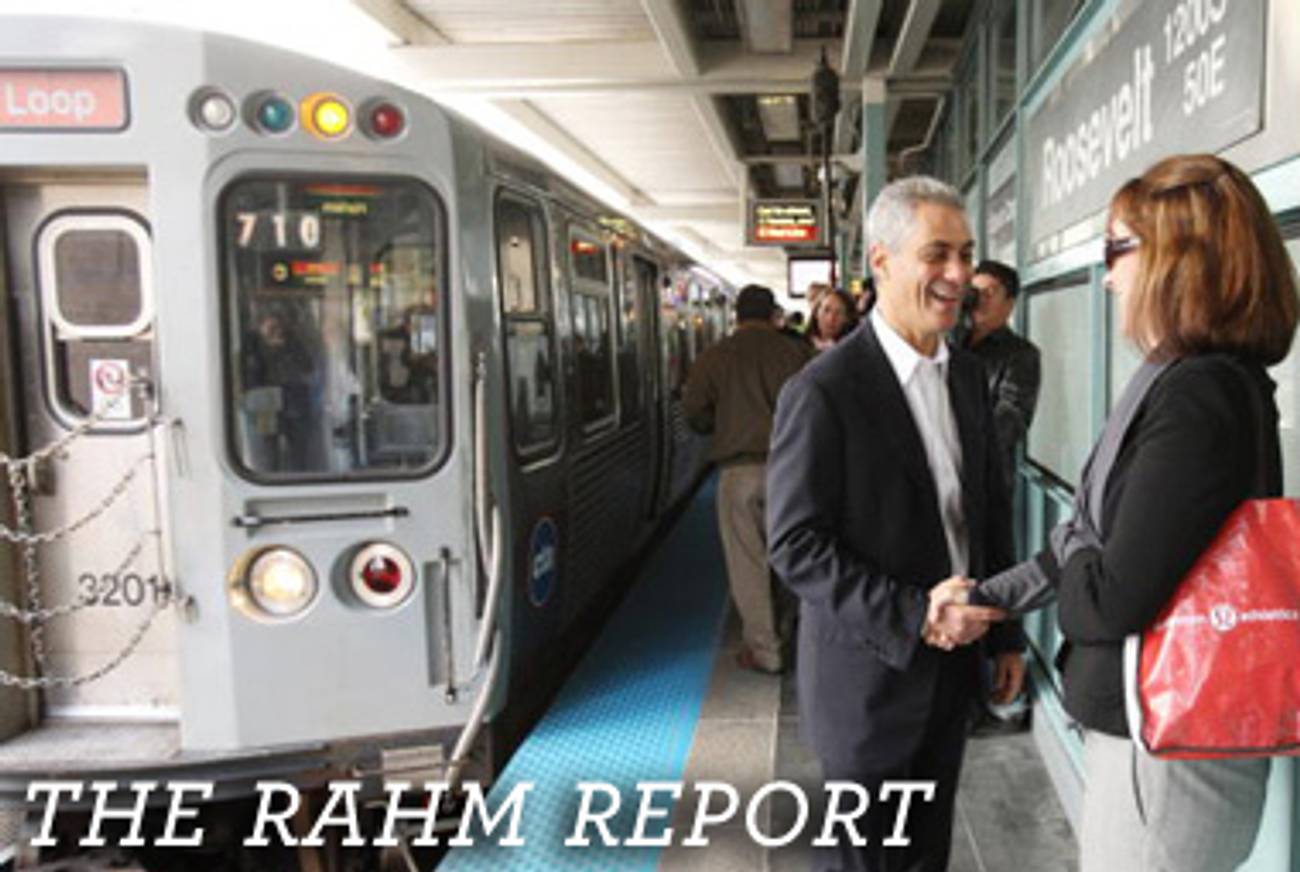Out of the Loop
Rahm Emanuel won’t be Chicago’s next mayor, because the city won’t elect a Jew




It doesn’t matter how big a war chest Rahm Emanuel can accumulate, to whom he sends dead fish wrapped in newspaper, or how many folksy features the New York Times runs to give his campaign legs. “Rahmbo” will never be mayor of Chicago.
I am hardly the only one to be un-wowed by the former Congressman’s announcement that he was leaving his position as White House chief of staff to campaign for mayor of the Second City. But the early blogosphere reaction got everything wrong: Chicago’s Jewish voters may shun Emanuel because his politics are either too conservative or not conservative enough (in other words, Jews are either disappointed with Obama or critical of his position on Israel), one ventured. An equally boilerplate line of thinking speculated if Emanuel does not win it is because he is “too Washington” and “not Chicago” enough, as one timorous blog ventured after his resignation from the White House.
This is all ridiculous. Emanuel doesn’t stand a chance here because, as one longtime Chicagoan put it to me recently, he is “too Jewish” in a city that has never had a Jewish mayor and a state that has never had a Jewish attorney general or U.S. senator, despite having the fifth-largest Jewish population of any U.S. city, according to the World Jewish Congress.
“He has a potty mouth,” another bystander put it, basically repeating the sentiment.
I grew up on the East Coast, but I’ve lived in Chicago for 10 years—as long as I lived in New York as an adult—and by now I am all too acquainted with this sort of thinking. Emanuel’s brash public persona, which in New York and Washington is synonymous with the allegedly Jewish qualities of ambition, striving, and aggression—all desirable qualities, or at least ones that get you talked about on Sunday morning news shows—does not play in the power corridors here.
Chicago might be rough and tumble, but where Jews are concerned the most racially and ethnically segregated city in the nation prefers repressed politesse, a country-club attitude more pre-Civil Rights than post-racial. Whenever I complain about this to New Yorkers I get bewildered stares and shrugs. They’re too concerned with Palestine to bother with what’s going on in a flyover zone.
As everyone who has not been asleep for the past two years knows, since Emanuel’s arrival in the White House, he has traded on his Jewishness in the casual, shorthand way familiar to anyone who has lived on the East or West Coast, now mentioning his bar mitzvah, then talking about his Tel Aviv-born father. Every fact in every article about him, from his getting accepted to Juilliard for ballet to his doing yoga (full disclosure: I once practiced Vinyasa a few mats away from him) gets measured against the fact of his Jewishness. None of that is worth a dime here.
One piece of evidence in the Emanuel-is-too-Jewish-to-win argument is simply numbers: Whereas Jews make up 9 percent of New York City’s population, the percentage of Jews in the Chicago metropolitan area is about 2 percent.
Irving Cutler’s The Jews of Chicago: From Shtetl to Suburb, the classic work on the subject, tells the story of the vanishing urban Chicago Jewry with a mournfulness only bested by Irving Howe’s World of Our Fathers. The percentage of Chicagoland Jews living in the suburbs grew from 5 percent in the 1950 to 70 percent in the 1990s, Cutler reports.
Indeed, given that Emanuel grew up in the North Shore suburb of Wilmette, to cast his appearance in Chicago as a homecoming is as absurd as saying that Jersey Shore’s Snooki is from New York City.
This is my second tour in the city. The first one began in 1982, when I arrived at the University of Chicago campus in Hyde Park.
It’s hard to say which was more shocking to me initially: the fact that six years earlier neo-Nazis won the legal right to march in Skokie, a Northern suburb where many Holocaust survivors settled, or that one of the first things my college boyfriend, a Polish-American from the Northwest side, said to me was that he had never met a Jew before. I had never been a victim. Nor had I had a chance to be the Other; I had no idea how to play either of these roles.
As a sophomore, I watched the ugly mayoral race between Harold Washington and Bernard Epton, both of whom were from Hyde Park, which the rest of the city scorned as out of touch until Obama got elected.
Washington was an African-American Democrat, and Epton was a Jewish Republican. Epton campaigned with the slogan “Epton. Before It’s Too Late.” Washington won and became the city’s first African-American mayor, but he died in office.
Since then, the most prominent role Jews have played in Chicago politics is that of scapegoat. One of the most embarrassing events occurred in the spring of 1988, when Steve Cokley, a conspiratorially minded aide to Washington’s successor and Chicago’s second African-American mayor, Eugene Sawyer, speculated that Jewish doctors injected the HIV virus into black babies. It took Sawyer a week to fire him. The story made the national news, and several New York Times pieces accused the Second City itself of anti-Semitism. Op-ed columnist Anthony Lewis, channeling Arthur Miller, thundered “Attention Must Be Paid.” Other writers argued that the majority of African-Americans supported ejecting Cokley from office and that the city’s two African-American newspaper columnists, as well as Richard M. Daley, then Cook County State’s Attorney, spoke out against him. Lewis’ piece quoted Michael Kotzin, now the executive vice president of the Jewish Federation of Chicago: “There has been some conspicuous silence,” he said. “Anti-Semitism gets out there in the marketplace, and leaders ignore it.”
It’s absurd to say that anti-Semitism flourishes in the Midwest more than anywhere else—hatred does not respect geography. But Kotzin’s observation resonates for me. Midwestern reticence, which New Yorker writer Calvin Trillin once summed up with three words, “no big deal,” combined with a shrinking Jewish community and warring constituencies, seems to lead to a climate where, in some neighborhoods, it is still considered acceptable—even politically advantageous—to voice anti-Semitism. In 2009, Rev. Jeremiah Wright said about the president who had already distanced himself from his fiery friend: “Them Jews ain’t going to let him talk to me.” The same year, Jewish cemeteries were vandalized and swastikas defaced buildings at my university.
Alderman William Singer, an Obama supporter and a candidate for mayor in the 1970s, addressed the city’s reputation where Jews are concerned in a Daily Beast article on Friday: “[T]he city has become more mature” since anti-Semitic taunts were hurled at him, he said.
Maybe so, but it still seems lamentably stuck in adolescence. Last year, the most improbable Jewish candidate for lieutenant governor was Scott Lee Cohen, whom the local press dubbed the “millionaire pawnbroker.” Initially ignored, Cohen was ousted by Democratic leaders after he won in the heavily Jewish districts in the city. Then the local media reported that he was a steroid-pumping, prostitute-dating, high-school drop-out, that he allegedly once held a knife to ex wife’s throat and that he owed back child support. Obviously no prodigal son.
After Emanuel announced his candidacy, I took a spin downtown to see the new Spertus Museum exhibit, Chicago’s Jewish History.
Where’s the new exhibit? I asked the guard.
“It’s behind you,” she said.
I turned around. Chicago’s Jewish History was crammed into a tiny 400-square-foot space at one end of the lobby, roughly the size of a budget New York hotel room.
In a space this size, I don’t know where Emanuel can fit in.
Rachel Shteir, a professor at the Theatre School of DePaul University, is the author of three books, including The Steal: A Cultural History of Shoplifting, to be published next year.
NOTE: An earlier version of this article incorrectly stated that Illinois has never had a Jewish state senator. It also misidentified Richard M. Daley’s job title in 1988. He was Cook County State’s Attorney not attorney general.
Rachel Shteir, a professor at the Theatre School of DePaul University, is the author of three books, including, most recently, The Steal: A Cultural History of Shoplifting. She is working on a biography of Betty Friedan for Yale Jewish Lives.